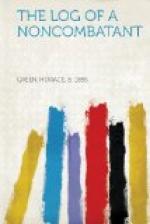The military and civil authorities looked upon the correspondent as an embryo spy. And if the correspondent’s sympathies were foreign, he was a thousand times worse than the ordinary spy, because he could make use of the cable and press to spread his information.
While waiting in Berlin for a chance to go to the front, I became, therefore, more and more conscious of surveillance. Whether it was the fact of being so much alone, or due perhaps to an unfortunately English-like appearance, I do not know. At all events, the long arm of the Secret Service continuously cast a shadow over my shoulder: I even became suspicious of myself.
For one who has not been through the experience it is difficult to appreciate the strain of such constant, unending suspicion. On July 17,1912, I stood beside the body of Herman Rosenthal, the gambler, as it lay in the coffin in the parlor of his house in the Tenderloin. My newspaper had sent me to “cover” the funeral, and I managed, because of some previous knowledge of the household, and by giving the impression of a mourner, to gain access. The murderers had not yet been caught. Because the public knew nothing of “Lefty” Louie, or “Gyp the Blood,” or even of the late Lieutenant Becker, it was common gossip that the criminals lurked in the neighborhood, and that, in order to avoid suspicion, they would appear among the chief mourners. Therefore, each eye was turned against its neighbor, and each man, as he passed you, asked the silent question,—“Did you shoot Herman Rosenthal?” During all the months on the Continent, and particularly in Germany, I felt myself at Rosenthal’s funeral.
To a greater or less degree other correspondents had similar experiences. I must mention one or two of them, in spite of the fact that they may dim the importance of my own adventures. There was Swing, of Chicago, German by relationship and sympathy, who championed the Kaiser’s cause and in his dispatches blew the Teuton horn in the Middle West of America. Swing was given exceptional privileges, including a typewriter and telephone near the Foreign Office. Yet Swing himself was constantly shadowed, and it is a fact that every time he used the telephone (and he was never permitted to speak in English) a Secret Service agent cut in on the wire to listen to the conversation.
An anecdote which I have heard in connection with the same correspondent, although I do not vouch for its accuracy, shows that “keeping the lid” on newspaper men had its humorous side. It likewise indicates the initiative and aggressiveness of many American correspondents, who, as a rule, went right ahead in the face of military regulations, in some cases risking their lives, and in almost every case refusing to be “bluffed out,” even where the threatened penalty was death. Swing had made his way to the battle front near—– -----, where he was taken into custody and brought before Von Mumm, then on a visit to Staff Headquarters.




